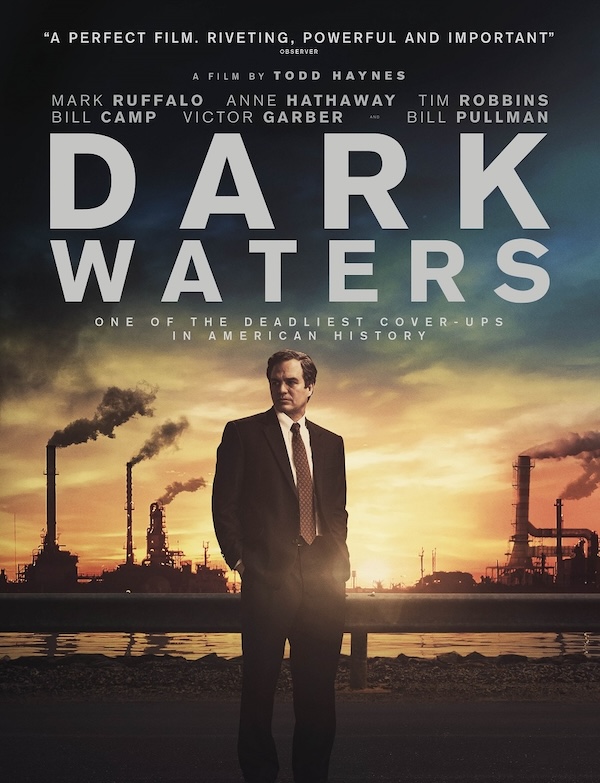
Directed by Todd Haynes; produced by Participant Media along with Mark Ruffalo
126 minutes
participant.com/campaign/dark-waters
“Dark Waters” is a 2019 film, starring Mark Ruffalo and Anne Hathaway, about a lawyer who sues Dupont Corporation for poisoning residents in Parkersburg, West Virginia, through the introduction of PFAS chemicals to their water supply.
Based on a true story, the film begins in 1998 when lawyer Robert Bilott (Ruffalo), who works for a firm in Cincinnati, Ohio, that, ironically, defends corporations in legal actions, is visited by a farmer, Wilbur Tennant, whose cows are dying in massive numbers. Bilott reluctantly investigates and realizes that the cause of these deaths, and cancers in residents in nearby Parkersburg, is a PFAS chemical, called PFOA (also referred to as C8 in the film), within the water supply.
Bilott discovers that PFOA is unregulated by the U.S. Environmental Protection Agency (EPA) but that Dupont, which uses the substance for Teflon and other products, has been monitoring its effects for decades. Dupont workers who had contact with the chemical were removed from their jobs after signs of illness. PFOA was packed in barrels and buried near Tennant’s farm, where his cows later died.
Despite resistance from his law firm, Bilott sues Dupont, unleashing over a decade of legal wrangling. Thousands of Parkersburg area residents undergo testing for PFOA in their bodies, eventually demonstrating that many are sick and practically all have the “forever chemical” in their blood.
Despite support from his wife, Sarah (Hathaway), Bilott suffers emotionally, financially, reputationally, and physically. However, the real victims, whose experiences are downplayed in the film, are Tennant, who dies of cancer; his 190 dead cows; other cancer victims (only briefly referenced); and the millions of humans and animals living with PFAS in their bodies today.
Not until 2015, 17 years later, do cases of PFOA poisoning in Parkersburg finally come to trial. The film ends with Bilott winning the first of many cases; eventually, Dupont settles all 3,535 cases for $670.7 million. That’s about $190,000 per person before lawyer’s fees — enough to maybe pay for a plaintiff’s cancer treatments but not for the pain and insecurity of living with cancer for the rest of their life. Since Dupont estimated profits of $1 billion per year from Teflon sales, the $670 million payout, and another settlement with local governments of $1.18 billion in 2024, was just a cost of doing business.
In spite of their immoral behavior, knowing of the toxic effects of PFAS products for over 50 years but doing nothing, no Dupont employee has ever been prosecuted or imprisoned for the premature deaths of thousands.
Despite Bilott’s persistence, this film demonstrates how hard it is to fight against mega-corporations like Dupont but also how necessary it is to protect the public’s health and safety. Despite PFOA’s carcinogenic properties, Teflon and other products made with PFAS chemicals remain easily available throughout the United States. Will we ever get them off the shelves?
See the movie, “Dark Waters,” available to check out from many libraries in Maine and beyond, but don’t watch it with rose-colored glasses.
– Larry Dansinger
This review was originally published in the spring 2025 issue of The Maine Organic Farmer & Gardener. Browse the archives for free content on organic agriculture and sustainable living practices.
